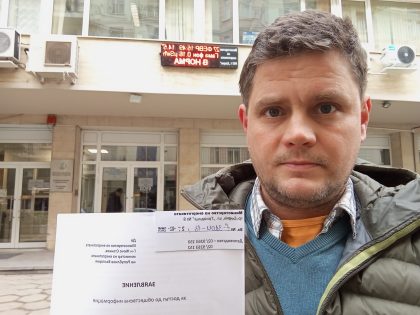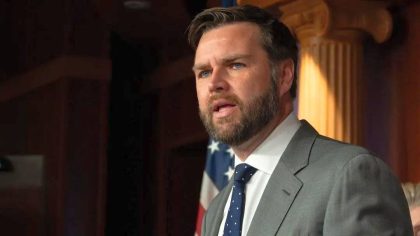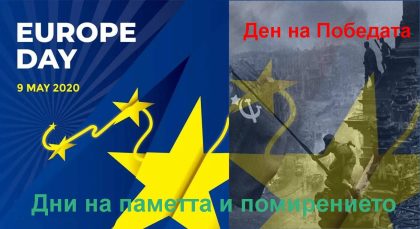Author: Maria Guineva /Novinite.com/
On Wednesday, the BulgarianParliament passed definitively the controversial Forestry Act, giving a green light to construction of skitracks and lifts without changing the status of use of the land.
After that things broke loose…
Opponents of the Act have long insisted that this is one of the most lobbyist laws ever adopted in Bulgaria, benefiting a handful of shady oligarchs, and threatening with plundering the country’s last significant natural resource. According to them, the forests in protected areas of Bulgaria, which occupy only 5% of the country, will be the most vulnerable. The challengers of the debatable lawmaking, along with WWF, distributed a list of eight disturbing precedents in the amendments, concerning the use of lands in the country.
Organized spontaneously by the social network Facebook, in a flash mob, thousands of citizens have been gathering every evening now in the area of Orlov Most (Eagles Bridge) in downtown Sofia to protest the move of the MPs.
The demonstrators blocked traffic on the city’s main thoroughfare „Tsarigradsko Shosse,“ triggering direct, albeit not very violent, clashes with riot police and over 20 arrests.
Bulgarian Prime Minister, Boyko Borisov, told the nation that the Forestry Act is indeed lobbyist, but lobbying for and benefiting snowboarders, skiers and allwinter sports lovers. He vowed that no rally will stop his government from advancing the country as a tourist destination.
This statement prompted jokes that Bulgarians even could list by name the profiting skier(s).
Back in time, it all started at the beginning of December 2011 with the refusal of theVitosha Ski company to turn on lifts and other ski facilities on the VitoshaMountain near the capital Sofia on the grounds of previous texts from the Forestry Act making the activity illegal.
The old law mandated owners of such equipment and facilities to have an established „servitude“ (a status for full-rights on the use of real estate) in order to clean and secure the lifts paths. Vitosha Ski was prevented from applying for it over them lacking an approved comprehensive development plan (PUB).
The company proposed a PUB for a new ski zone, but it was rejected because it included protected territories and because the environmental impact assessment was not done according to the rules. Vitosha Ski then attacked the decision of the Ministry of Environment and Waters in Court, but left their PUB unchanged.
The Directorate of the Vistosha „Natural Park“ countered that the paths of the liftscan be cleaned without the servitude and through the rent contract. The Forestry Agency confirmed they were not against and would not interfere with the use of skitracks and lifts.
The Director of the Park, Toma Belev, recipient of the WWF 2012 annual award, and one of the top adversaries of Vitosha Ski, was dismissed after a slander campaign against him in media close to those in power and replaced by someone more „docile.“
Vitosha Ski is owned by banker Tseko Minev. Minev, through his offshore companies – ski operators Yulen and Vitosha Ski, now controls the major ski areas in Bulgaria – Bansko and Vitosha.
According to an investigative report of Bivol.bg, official partner of WikiLeaks for Bulgaria, and of e-vestnik, remnants of the former Multigroup empire of the late Iliya Pavlov, through a company registered in Vaduz, Liechtenstein (similar to an offshore one), and indirectly Minev’s First Investment Bank also own Borovets.
Minev is the Chairman of the Bulgarian Ski Federation. The closeness between him and Borisov is well-known and documented by joint appearances and photo ops.
The „lobbied for“ winter sports lovers in Sofia and its visitors ended up deprived from enjoying skiing near the capital for the entire winter season. Those with more cash went to Bansko and Borovets, which benefited once again the same „Skier.“
Who are the „Skier“ and his bank?
In November 2009, now-former US Ambassador in Sofia, John Beyrle, considered one of the top and best US diplomats, wrote the following in a secret cable to the Department of State:
First Investment Bank (FIB) was founded in 1993 by Tseko Minev and Ivailo Mutafchiev with funds of questionable origin. They remain owners, along with twooffshore companies from the Cayman Islands and the Channel Islands. The European Bank for Reconstruction and Development (EBRD), an early supporter and investor, recently told us that their participation in FIB is seen as bad spot on EBRD’s record. FIB is now considered to have one foot in the legitimate retail world) it is known as one of the most aggressive and „polished“ banks) as well as one in the murkier criminal realm (End Quote).
Meanwhile, on the backdrop of a recent EP forum in Brussels, focused on lack of freedom of Bulgarian media, many mainstream ones downplayed the protest, mentioning it briefly or not at all. Most media in Bulgaria are obviously too busy with their own wars… Others, such as the largest private TV channel bTV, were hurrying to air a report on Borisov’s birthday, which also fell on this remarkable date. The TV chose to skip the rally entirely and tell viewers about the endless list of absurd, bootlicker gifts he has received – a pickaxe with a red bow, ribbon-cutting scissors, a cake looking like a highway, a real 3-km-long highway and so on…
In the aftermath of the first protest, the opposition on the left and on the right united in condemning the amendments and in demanding from the President toveto them.
It must be noted that only 109 MPs out of 240 were present at the voting of such significant legislation, with the already well-known potential to shake the country. 77 were from the ruling, center-right Citizens for European Development of Bulgaria party, GERB, the rest – independents and from the opposition.
Those from GERB, understandably, had a birthday to take care of as top priority. The opposition’s priority remains unknown. And no, none of them, not even a single Bulgarian politician attended the protest rally…
The protestors are mainly young people and families with little children. They carried posters reading: „Forests mean life“ and „Sorry for disturbing you. We are just trying to rescue what has been left of Bulgaria.“ They chanted „Happy Birthday Boyko“ and „Mafia“… In a reminiscence of the 60s anti-war youth demonstrations in the western world, they hugged policemen (sent in much stronger numbers than to other roadblocks) in riot gear.
Amidst an avalanche of reports about kitsch prom attires, Bulgarian youth being illiterate and ignorant, we now witnessed, according to all accounts, a group of non-violent, bright, intelligent and alert young people. They say they are notenvironmentalists, but citizens.
They wrote on Facebook that young people in Bulgaria now have three solutions: Terminal 1 of Sofia Airport, Terminal 2 of Sofia Airport, and Eagles’ Bridge.
These people don’t want to leave Bulgaria; they want to have a say in their own country. They don’t want to be squished by a strong hand and mocked with arrogance. They are not against the advancement of tourism and modern skifacilities, but refuse to put up with their State tailoring lawmaking on the order ofoffshore companies and offshore banks.
Behind the worn-out masks of politicians, shady oligarchs, mutras (often all three in one), and a generation opressed by the Communist regime finally peeks the new face of Bulgaria. Its future. The true proponents of western democracy. The light at the end of the tunnel.
.






